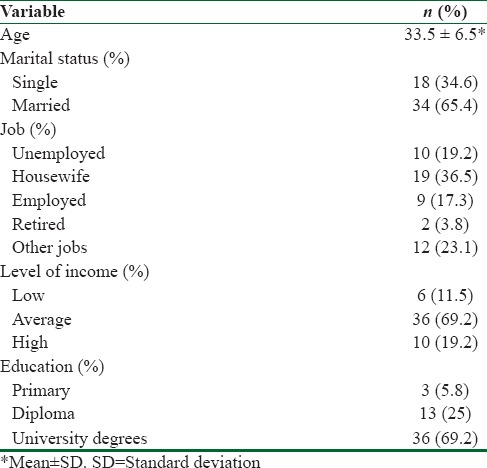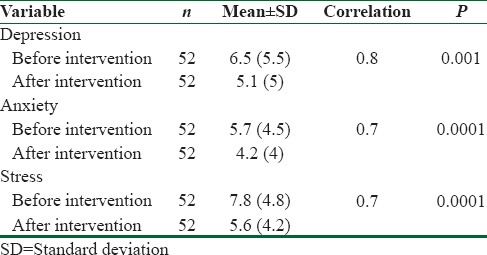The Effect of Yoga on Stress, Anxiety, and Depression in Women (original) (raw)
Abstract
Background:
In recent decades, several medical and scientific studies on yoga proved it to be very useful in the treatment of some diseases. This study was conducted to investigate the effects of yoga on stress, anxiety, and depression in women living in Ilam, Iran.
Methods:
This study is a quasi-experimental study with pre-post test. To collect data, the questionnaire of DASS-21 (Depression Anxiety Stress Scale-21) was used. For eligible samples, hatha yoga exercises and training sessions were held for 4 weeks (3 time/weeks; 60-70 min each) by a specialist. Data were analyzed using SPSS version 20.
Results:
52 women with a mean age of 33.5 ± 6.5 were included for analysis. Depression, anxiety, and stress decreased significantly in women after 12 sessions of regular hatha yoga practice (P < 0.001).
Conclusions:
Yoga has an effective role in reducing stress, anxiety, and depression. Thus, it can be used as complementary medicine.
Keywords: Anxiety, depression, stress, women, yoga
Introduction
Complementary medicine refers to a category of treatments and interventions that have not been raised in modern medicine.[1] Yoga is a Sanskrit word meaning unity of mind and body, which has been used in Eastern societies since 5000 years ago and has recently received much attention from Western countries.[2] In recent decades, several medical and scientific studies on yoga proved it to be very useful in the treatment of some diseases.[3] Studies have demonstrated effect of yoga for many conditions, including multiple sclerosis,[4] asthma,[5] irritable bowel syndrome,[6] lymphoma,[7] hypertension,[8] drug addiction,[9] osteoarthritis,[10] and mental health issues.[11]
Increased stress, depression and anxiety are the features of modern lifestyle.[12] Due to the adverse effects of drugs in the treatment of anxiety and depression, and in some cases their lack of effectiveness, researchers seek nonpharmacological and noninvasive treatment for these disorders.[13] Yoga exercises was improved the variables of self-description, psychological status, and the quality of life.[14] Researches suggest that yoga as an intellectual and mental exercise, improves health feeling.[15] Furthermore, yoga can improve the psychological conditions for monitoring and managing stress and negative emotions, increase positive emotions, and help mental balance.[11] However, despite the popularity and the positive psychological and physiological effects of yoga, it is not widely studied to find how much it really prevents and treats mental disorders. Research in this area is limited in Iran. This study was conducted to investigate the effects of yoga on stress, anxiety, and depression in women living in Ilam from Iran, during 2014 to 2015.
Methods
Design and ethics
This study is a quasi-experimental study with pre-post test that was approved by the Ethics Committee of the Ilam University of Medical Sciences. The population consisted of all women admitted to yoga club in the city of Ilam in 2014–2015.
Inclusion and exclusion criteria
Inclusion criteria were educated, nonathlete and nonpregnant women with the ability to perform hatha yoga exercises without inability to exercise. Exclusion criteria included refusal or unwillingness to perform yoga continuously, simultaneous exercise, and receiving medication for mental disorders.
Assessment tools and management
To collect data, the questionnaire of DASS-21 (Depression Anxiety Stress Scale-21) was used. The validity and reliability of this standard questionnaire was examined by Sahebi et al. and Cronbach's alpha was estimated 0.7, 0.66 and 0.76 for depression, anxiety, and stress, respectively. in a study entitled “validation of depression anxiety and stress scale for an Iranian population”.[16] Each of the above mentioned states are assessed with seven questions. Hatha yoga exercises and training sessions were held 3 time/weeks; 60-70 min each (postures, breathing techniques, meditation) by a specialist. Before the intervention, questionnaires were completed by women. The intervention lasted 12 sessions. At the end of the 12th session, the questionnaire of DASS-21 was again completed by women.
Statistical procedures
The obtained data were analyzed using SPSS version 20 (IBM, Armonk, NY, USA). According to the established normality, paired sample _t_-test was used for comparing the results before and after the intervention. The threshold of significance was set at P < 0.05.
Results
The total eligible sample consisted of 52 women with a mean age of 33.5 ± 6.5 years. Other demographic characteristics are shown in Table 1.
Table 1.
Demographic characteristics of the women

The difference between mean scores of depression, anxiety, and stress before and after 12 sessions of regular hatha yoga practice was statistically significant [Table 2].
Table 2.
A comparison of the mean scores of stress, anxiety, and depression before and after the intervention of 12 sessions of regular hatha yoga practice session (_n_=52)

Discussion
The present study showed that 12 sessions of intervention as regular hatha yoga exercise significantly reduced stress, anxiety, and depression in women.
In other studies, including Tayyebi et al., among hemodialysis patients,[17] Rahnama et al., among multiple sclerosis patients,[15] Javnbakht et al., among women living in Mashhad,[18] and Gong among pregnant women,[19] the significant positive effects of yoga in reducing stress, anxiety, and depression have been confirmed. In the study of Streeter et al.,[20] it was found that greater improvement in mood and greater decreases in anxiety during 12 week of yoga intervention compared to walking group. Oken et al.[4] did not observe any significant effect of yoga on improvement in mood in patients with MS, the limitation of this study is the small number of intervention sessions (one session per week).
Dalgas et al. proved that the nature of yoga is controlling the mind and central nervous system and unlike other sports, it has a moderating effect on the nervous system, the hormonal emissions, physiological factors, and regulation of nerve impulses; therefore, it can be effective in improving depression and mental disorders.[21]
One limitation of this study was that only the women were studied and since there were no yoga clubs for men, they have not been studied in this research.
Conclusions
Yoga has an effective role in reducing stress, anxiety, and depression that can be considered as complementary medicine and reduce the medical cost per treatment by reducing the use of drugs. Given that, the reason behind the effect of yoga on stress, anxiety, and depression is not clear for us and may be transient, and it is suggested that future studies are done to investigate the long-term effect of yoga on stress, anxiety, and depression.
Financial support and sponsorship
Ilam University of Medical Sciences.
Conflicts of interest
There are no conflicts of interest.
Acknowledgments
The authors would like to thank Ilam University of Medical Sciences for financial support and also yoga instructors (Miss. Morshedi and Miss. Khosravi) for their cooperation.
References
- 1.Borji M, Otaghi M, Salimi E, Sanei P. Investigating the effect of performing the quiet time protocol on the sleep quality of cardiac patients. Biomedical Research. 2017;28:7076–80. [Google Scholar]
- 2.Barnes PM, Powell-Griner E, McFann K, Nahin RL. Complementary and alternative medicine use among adults: United States, 2002. Adv Data. 2004:1–19. [PubMed] [Google Scholar]
- 3.Singh S, Malhotra V, Singh KP, Sharma SB, Madhu SV, Tandon OP. A preliminary report on the role of yoga asanas on oxidative stress in non-insulin dependent diabetes mellitus. Indian J Clin Biochem. 2001;16:216–20. doi: 10.1007/BF02864866. [DOI] [PMC free article] [PubMed] [Google Scholar]
- 4.Oken BS, Kishiyama S, Zajdel D, Bourdette D, Carlsen J, Haas M, et al. Randomized controlled trial of yoga and exercise in multiple sclerosis. Neurology. 2004;62:2058–64. doi: 10.1212/01.wnl.0000129534.88602.5c. [DOI] [PubMed] [Google Scholar]
- 5.Freitas DA, Holloway EA, Bruno SS, Chaves GS, Fregonezi GA, Mendonça KP. Breathing exercises for adults with asthma. Cochrane Database Syst Rev. 2013;1:CD001277. doi: 10.1002/14651858.CD001277.pub3. [DOI] [PubMed] [Google Scholar]
- 6.Taneja I, Deepak KK, Poojary G, Acharya IN, Pandey RM, Sharma MP. Yogic versus conventional treatment in diarrhea-predominant irritable bowel syndrome: A randomized control study. Appl Psychophysiol Biofeedback. 2004;29:19–33. doi: 10.1023/b:apbi.0000017861.60439.95. [DOI] [PubMed] [Google Scholar]
- 7.Cohen L, Warneke C, Fouladi RT, Rodriguez MA, Chaoul-Reich A. Psychological adjustment and sleep quality in a randomized trial of the effects of a Tibetan yoga intervention in patients with lymphoma. Cancer. 2004;100:2253–60. doi: 10.1002/cncr.20236. [DOI] [PubMed] [Google Scholar]
- 8.Chu P, Gotink RA, Yeh GY, Goldie SJ, Hunink MG. The effectiveness of yoga in modifying risk factors for cardiovascular disease and metabolic syndrome: A systematic review and meta-analysis of randomized controlled trials. Eur J Prev Cardiol. 2016;23:291–307. doi: 10.1177/2047487314562741. [DOI] [PubMed] [Google Scholar]
- 9.Shaffer HJ, LaSalvia TA, Stein JP. Comparing Hatha yoga with dynamic group psychotherapy for enhancing methadone maintenance treatment: A randomized clinical trial. Altern Ther Health Med. 1997;3:57–66. [PubMed] [Google Scholar]
- 10.Garfinkel MS, Schumacher HR, Jr, Husain A, Levy M, Reshetar RA. Evaluation of a yoga based regimen for treatment of osteoarthritis of the hands. J Rheumatol. 1994;21:2341–3. [PubMed] [Google Scholar]
- 11.Duan-Porter W, Coeytaux RR, McDuffie JR, Goode AP, Sharma P, Mennella H, et al. Evidence map of yoga for depression, anxiety, and posttraumatic stress disorder. J Phys Act Health. 2016;13:281–8. doi: 10.1123/jpah.2015-0027. [DOI] [PMC free article] [PubMed] [Google Scholar]
- 12.Brandon H Hidaka. B.A. Depression as a disease of modernity: explanations for increasing prevalence. J Affect Disord. 2012;140:205–14. doi: 10.1016/j.jad.2011.12.036. [DOI] [PMC free article] [PubMed] [Google Scholar]
- 13.Little N. Depression Treatment Options. [Last cited on 2007 Jan 01]. Available from: http://www.insightjournal.com/
- 14.Richter S, Tietjens M, Ziereis S, Querfurth S, Jansen P. Yoga Training in Junior Primary School-Aged Children Has an Impact on Physical Self-Perceptions and Problem-Related Behavior. Frontiers in Psychology. 2016;7:203. doi: 10.3389/fpsyg.2016.00203. [DOI] [PMC free article] [PubMed] [Google Scholar]
- 15.Rahnama N, Bambaeichi E, Arbabzadeh S, Sadeghipour H, Etemadifar M, Namazizadeh M. Effects of yoga on depression in women with multiple sclerosis. J Isfahan Med Sch. 2011;29:483–90. [Google Scholar]
- 16.Sahebi A, Asghari A, Salari RS. [Validation of depression anxiety and stress scale for an Iranian population] Journal of Iranian psychologists. 2005;1:299–312. (Persian) [Google Scholar]
- 17.Tayyebi A, Babahaji M, Sadeghisherme M, Ebadi A, Eynollahi B. Study of the effect of Hatha Yoga exercises on stress, anxiety and depression among hemodialysis patients. IJCCN. 2011;4:67–72. [Google Scholar]
- 18.Javnbakht M, Hejazi Kenari R, Ghasemi M. Effects of yoga on depression and anxiety of women. Complement Ther Clin Pract. 2009;15:102–4. doi: 10.1016/j.ctcp.2009.01.003. [DOI] [PubMed] [Google Scholar]
- 19.Gong H, Ni C, Shen X, Wu T, Jiang C. Yoga for prenatal depression: A systematic review and meta-analysis. BMC Psychiatry. 2015;15:14. doi: 10.1186/s12888-015-0393-1. [DOI] [PMC free article] [PubMed] [Google Scholar]
- 20.Streeter CC, Whitfield TH, Owen L, Rein T, Karri SK, Yakhkind A, et al. Effects of yoga versus walking on mood, anxiety, and brain GABA levels: A randomized controlled MRS study. J Altern Complement Med. 2010;16:1145–52. doi: 10.1089/acm.2010.0007. [DOI] [PMC free article] [PubMed] [Google Scholar]
- 21.Dalgas U, Stenager E, Ingemann-Hansen T. Multiple sclerosis and physical exercise: Recommendations for the application of resistance-, endurance- and combined training. Mult Scler. 2008;14:35–53. doi: 10.1177/1352458507079445. [DOI] [PubMed] [Google Scholar]